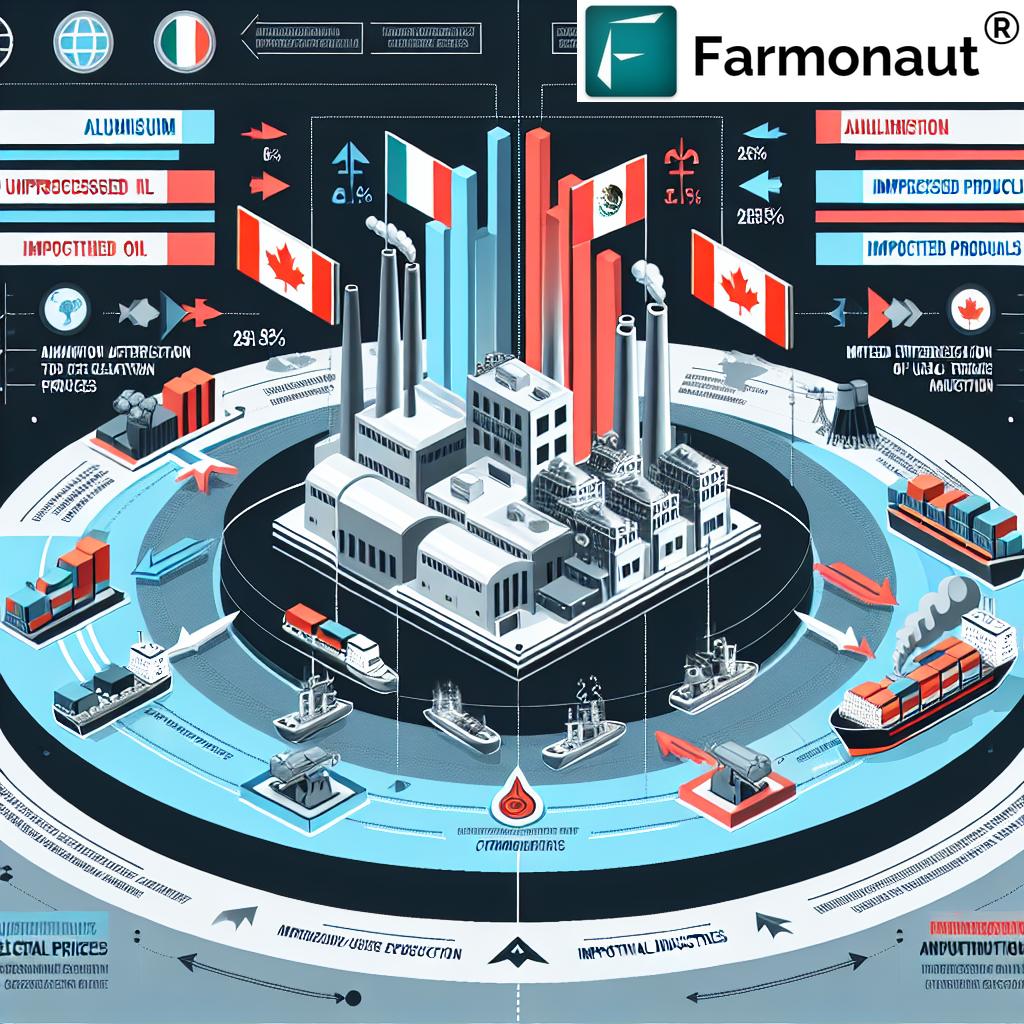Navigating North American Trade Tensions: How Farmonaut’s Solutions Support Agricultural Supply Chains Amid Tariff Uncertainties
“Recent US import tariffs affect over $300 billion worth of goods from Canada, Mexico, and China.”
In the ever-evolving landscape of international trade, recent developments have sent ripples through North American supply chains, leaving industries scrambling to adapt. As we delve into the complexities of these trade tensions, we’ll explore how innovative solutions from companies like Farmonaut are helping agricultural businesses navigate these uncertain waters.
Understanding the Impact of US Import Tariffs on North American Trade
The recent announcement of US import tariffs on goods from Canada, Mexico, and China has sparked significant concern across various sectors. These tariffs, which took effect on a recent Tuesday for Canadian imports, with timelines for Mexican and Chinese goods yet to be specified, have far-reaching implications for businesses and consumers alike.
At Farmonaut, we recognize the critical importance of staying informed about these economic shifts. Our satellite-based farm management solutions are designed to help agricultural businesses adapt to changing market conditions, including those brought about by trade policy changes.

The Economic Impact of Tariffs on Key Industries
The introduction of these tariffs is expected to have a significant impact on various industries, including:
- Automobiles: Increased costs for manufacturers and potentially higher prices for consumers
- Electronics: Disruptions in supply chains and possible price hikes for consumer goods
- Lumber: Higher costs for construction materials, potentially affecting the housing market
- Food Products: Elevated prices for imported ingredients and finished goods
For the agricultural sector, these tariffs pose unique challenges. Farmers and agribusinesses may face increased costs for imported equipment and materials, while also potentially losing access to key export markets if retaliatory measures are implemented.
The Role of Technology in Mitigating Trade Uncertainties
In these challenging times, technology plays a crucial role in helping businesses adapt and thrive. Farmonaut’s advanced satellite-based solutions offer valuable tools for agricultural businesses navigating these uncertain waters:
- Real-time Crop Health Monitoring: Our satellite imagery technology helps farmers optimize their crop yields, potentially offsetting increased costs due to tariffs.
- AI-driven Advisory Systems: The Jeevn AI system provides personalized recommendations to help farmers make informed decisions in a changing economic landscape.
- Blockchain-based Traceability: In an era of complex international trade, our traceability solutions ensure transparency and build trust in supply chains.
Learn more about our innovative solutions by visiting our 
Trade Tensions and Border Security Measures
The administration’s rationale for these tariffs extends beyond economic considerations. There’s a dual focus on combating illegal drug production, particularly fentanyl, and addressing illegal immigration. However, data from U.S. Customs and Border Protection suggests that most fentanyl seizures occur at the southern border, raising questions about the effectiveness of using trade policy to influence drug-related actions by Canada, Mexico, and China.
These complex issues highlight the interplay between trade policy, border security, and international relations. At Farmonaut, we understand the importance of adaptability in the face of such challenges. Our solutions are designed to help agricultural businesses maintain efficiency and productivity, even as they navigate changing regulatory landscapes.
The USMCA and Changing North American Trade Dynamics
“The USMCA trade agreement, replacing NAFTA, governs $1.4 trillion in annual North American trade.”
The new tariffs present a challenge to the United States-Mexico-Canada Agreement (USMCA), a trade deal established under the previous administration that significantly reduced tariffs and promoted cross-border trade. This agreement, which replaced NAFTA, has been instrumental in shaping North American trade relations.
As agricultural businesses adapt to these changing dynamics, Farmonaut’s solutions can provide valuable support:
- Fleet and Resource Management: Our tools help agribusinesses optimize their logistics, potentially mitigating increased costs due to trade barriers.
- Carbon Footprinting: As sustainability becomes increasingly important in international trade, our carbon tracking features can help businesses stay compliant with evolving regulations.
Explore our API capabilities for custom integrations: Farmonaut API
Industry Responses and Potential Retaliatory Measures
Various industry representatives have voiced concerns about the potential adverse effects of these tariffs:
- The United Auto Workers (UAW) union has criticized the use of factory workers as leverage in broader policy disputes.
- The Aluminum Association stressed the significant dependency of U.S. manufacturers on imported aluminum from Canada.
- The Consumer Brands Association warned of rising prices for food products due to tariffs on essential ingredients.
Both Canada and Mexico have indicated that they will retaliate against the U.S. tariffs, which could diminish the competitiveness of American products in their markets. This potential for retaliatory measures underscores the need for businesses to stay agile and informed.

Impact on US Energy Imports and Manufacturing Costs
The tariffs could have significant repercussions for the U.S. oil and gas industry, particularly given Canada’s role as a key supplier of crude oil. This could lead to increased fuel prices, potentially affecting various sectors of the economy.
For manufacturers, the tariffs present a double-edged sword. While they may provide some protection against foreign competition, they also increase the costs of imported materials and components. This could lead to higher production costs and, ultimately, higher prices for consumers.
At Farmonaut, we’re committed to helping agricultural businesses navigate these challenges. Our solutions can help optimize resource usage and reduce waste, potentially offsetting some of the increased costs associated with these tariffs.
The Legal Landscape: Challenges and Implications
The tariffs are being enacted under the International Emergency Economic Powers Act (IEEPA), leveraging a national emergency declaration at the U.S.-Mexico border. This approach has raised eyebrows among legal experts and trade analysts, who anticipate potential legal challenges.
The use of trade policy as a tool for addressing broader issues like immigration and drug trafficking represents a significant shift in approach. It highlights the complex interplay between economic policy, national security, and international relations.
For agricultural businesses, staying informed about these legal developments is crucial. Farmonaut’s AI-driven advisory system can help farmers and agribusinesses stay up-to-date with the latest policy changes and their potential impacts on the industry.
Farmonaut’s Role in Supporting Agricultural Supply Chains
As the agricultural sector grapples with these trade uncertainties, Farmonaut’s solutions offer valuable support:
- Cost-Effective Precision Agriculture: Our satellite-based solutions help farmers optimize their operations, potentially offsetting increased costs due to tariffs.
- Increased Farm Productivity: By providing real-time data on crop health and weather patterns, we help farmers make informed decisions that maximize yields.
- Sustainability: Our carbon footprint tracking features help businesses stay compliant with evolving environmental regulations, which can be crucial in international trade.
Discover how Farmonaut can support your agricultural business:
North American Trade Tariff Impact Matrix
| Industry Sector | United States | Canada | Mexico |
|---|---|---|---|
| Automobiles | Moderate increase in production costs (+5%) | Significant export reduction (-15%) | Moderate export reduction (-10%) |
| Electronics | High increase in consumer prices (+10%) | Moderate export reduction (-8%) | Slight export reduction (-5%) |
| Agriculture | Moderate increase in input costs (+7%) | High export reduction (-20%) | Significant export reduction (-18%) |
| Lumber | High increase in construction costs (+12%) | Severe export reduction (-25%) | Minimal impact (-2%) |
| Energy | Slight increase in fuel prices (+3%) | Moderate export reduction (-10%) | Slight export reduction (-5%) |
This table provides a snapshot of the potential impacts across different sectors and countries. It’s important to note that these figures are projections and may change as the situation evolves.
The Broader Implications for North American Trade Relations
The introduction of these tariffs marks a significant shift in North American trade relations. If a trade war were to erupt between the U.S., Canada, and Mexico, it could lead to slowed economic growth in all involved countries. This could potentially exacerbate economic pressures for Mexico, contradicting the stated immigration objectives.
For the agricultural sector, these changes could mean:
- Altered trade flows and changes in market access
- Shifts in commodity prices
- Increased pressure to innovate and improve efficiency
At Farmonaut, we’re committed to helping agricultural businesses navigate these challenges. Our solutions are designed to improve efficiency, increase productivity, and provide valuable insights in an increasingly complex global market.
Looking Ahead: Strategies for Agricultural Businesses
As the situation continues to evolve, agricultural businesses need to stay informed and adaptable. Here are some strategies to consider:
- Diversify Supply Chains: Reduce reliance on single sources for key inputs
- Invest in Technology: Utilize solutions like Farmonaut to optimize operations and reduce costs
- Stay Informed: Keep abreast of policy changes and market trends
- Focus on Sustainability: As regulations evolve, sustainable practices can become a competitive advantage
Farmonaut’s solutions can support these strategies, helping businesses navigate the changing landscape of North American trade.
Farmonaut: Your Partner in Agricultural Innovation
In these uncertain times, having the right tools and insights can make all the difference. Farmonaut’s comprehensive suite of agricultural technology solutions is designed to help farmers and agribusinesses thrive, even in challenging economic conditions.
Our satellite-based crop health monitoring, AI-driven advisory systems, and blockchain-based traceability solutions provide valuable support for businesses navigating the complexities of international trade. By optimizing operations, improving productivity, and ensuring transparency, we help our clients stay competitive in a changing global market.
Earn With Farmonaut: Join our affiliate program and earn 20% recurring commission while helping farmers save 10%. Onboard 10 Elite farmers monthly to earn a minimum of $148,000 annually—start now and grow your income!
Learn more about our affiliate program: Earn With Farmonaut
Conclusion: Navigating the Future of North American Trade
As we navigate these uncertain waters of North American trade relations, it’s clear that adaptability and innovation will be key to success. The agricultural sector, in particular, faces both challenges and opportunities in this changing landscape.
At Farmonaut, we’re committed to providing the tools and insights needed to thrive in this new era of international trade. Our advanced technologies and data-driven solutions empower agricultural businesses to make informed decisions, optimize their operations, and stay competitive in a global market.
As we look to the future, one thing is certain: the businesses that embrace technology and innovation will be best positioned to weather these trade uncertainties and emerge stronger on the other side.
FAQ Section
Q: How do US import tariffs affect agricultural businesses?
A: US import tariffs can increase costs for imported agricultural inputs and equipment, potentially reducing profit margins. They may also lead to retaliatory measures from other countries, affecting export markets for US agricultural products.
Q: How can Farmonaut’s solutions help during trade uncertainties?
A: Farmonaut’s satellite-based crop monitoring, AI advisory systems, and blockchain traceability solutions help optimize farm operations, reduce costs, and ensure transparency in supply chains, enabling businesses to better navigate economic challenges.
Q: What is the USMCA and how does it relate to recent tariffs?
A: The USMCA (United States-Mexico-Canada Agreement) is a trade deal that replaced NAFTA. The recent tariffs challenge this agreement, which was designed to promote free trade between these North American countries.
Q: How might retaliatory measures from Canada and Mexico impact US farmers?
A: Retaliatory measures could result in reduced access to Canadian and Mexican markets for US agricultural products, potentially leading to oversupply in domestic markets and lower prices for farmers.
Q: Can technology help mitigate the impact of trade tensions on agricultural businesses?
A: Yes, technologies like those offered by Farmonaut can help businesses optimize their operations, reduce waste, and increase productivity, potentially offsetting some of the negative impacts of trade tensions.















